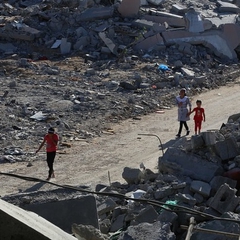Type 1 Diabetes in War
11 Mar 2015, 12:52 p.m. in Global Stories
In the midst of a war, life with type 1 diabetes is unthinkable. Recent communication with a man in Syria who fears for his life and the safety of his family sheds light on the urgent need for access to diabetes supplies and medical care. The man, who wishes to remain anonymous so as not to risk further harm, has escaped his home region in hopes of finding more stability and better care for his two-year-old son with type 1 diabetes. We agreed not to share any personal details about his background for this reason, but I am sharing some excerpts from our communications, highlighting issues that are difficult to imagine. His words speak volumes.
Before the crisis, we had an excellent health care system, so most medical service was free and anyone could get it. We had a lot of hospitals and medication dispensaries. For example, my region of about 100, 000 people had four major government hospitals and there were at least 10 dispensaries. Patients with diabetes were offered free insulin. The price of insulin and blood sugar measuring strips was not problematic for most patients with diabetes.
Now, after the crisis, most hospitals and dispensaries have been destroyed, their instruments stolen. Most doctors have escaped outside of the country and we have 12 million refugees, which means half of Syrians are now out of country. Access to the remaining hospitals carries a great danger and safe places are no longer safe. At this point, if someone is able to find work at all, the income is not more than $100 per month, but diabetes supplies and insulin cost at least $150 per month. The economic situation of the people who remain has gotten so bad that they cannot afford to eat and drink, so how will anyone be able to buy diabetes supplies?
We left our house and moved several times from place to place to find a safer place for my family. Like many others, we lived though very scary moments. Death is close to us too often, but we are always optimistic about a better future for our children. My son was diagnosed with diabetes about seven months ago, and since that time the physical and psychological burden has doubled on us. Every day and every moment there is a lot of fear of the risk of war and the risk of diabetes.
Some of the biggest struggles faced by people with diabetes in Syria include:
- Difficulty of securing insulin in many areas
- The lack of the necessary electricity for the preservation of insulin in the cooling devices
- The dire financial situation and therefore the inability to buy diabetes supplies
- Lack of health centers that can provide health care for these patients
- Lack of specialist for diabetes
- Death for many people with chronic diseases
Life is very difficult for healthy people in conditions of war; one of my friends told me that his daughter who is four years old urinates spontaneously whenever she hears the sound of shells. The life of patients with diabetes will be that much more difficult in light of the lack of basic medical supplies and materials. Our problem is tied with the war, and only when the war is over can much be offered for these miserable people. You can help us by providing a safe place for us, for these children and the sick, so that we can live in peace.




